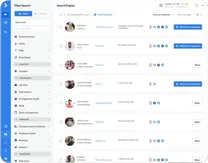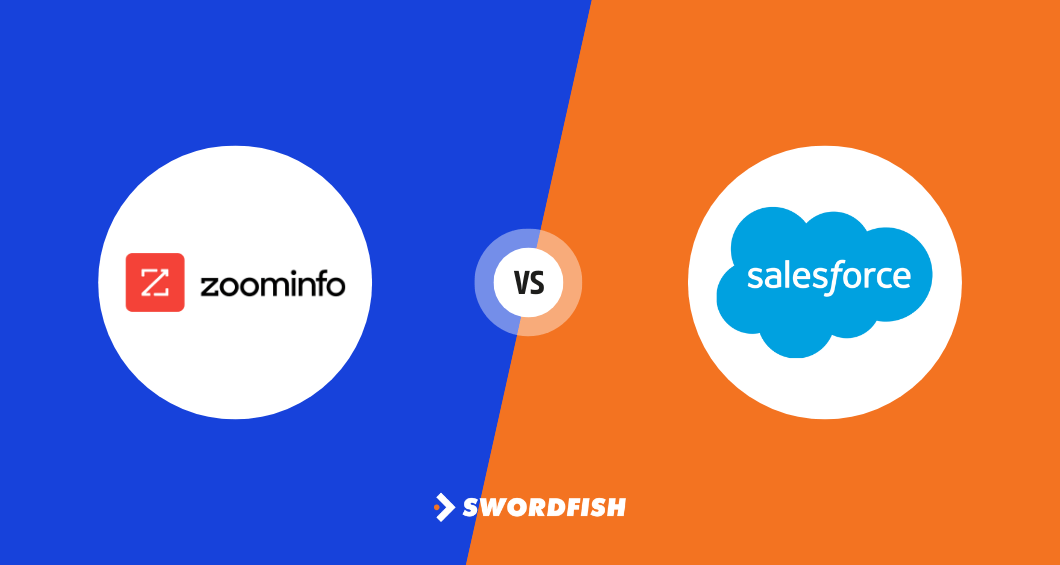
Are you confused between ZoomInfo vs Salesforce for your business’s sales and marketing needs? It’s quite the decision in today’s data-driven market.
Both platforms are renowned for their ability to soar up B2B sales and marketing efforts, but picking the right one can be a bit of a puzzle.
- ZoomInfo: Renowned for its massive database and robust prospecting tools, ZoomInfo is a powerhouse for businesses seeking detailed market insights and lead generation.
- Salesforce: Salesforce focuses on managing customer interactions across sales, marketing, and service sectors. It provides an all-encompassing platform for comprehensive customer relationship management.
However, the choice isn’t straightforward. Each platform brings its own set of strengths and specialties that could be pivotal, depending on your specific business needs.
So, let’s dive into this ZoomInfo vs Salesforce, and really get to know what each of these tools can do for you. We’re here to help you figure out which one is going to be your business’s best buddy.
Key Takeaways
- Focus: ZoomInfo specializes in detailed B2B data and insights while Salesforce offers a broader CRM platform.
- Method: For lead generation and management, ZoomInfo excels at targeted B2B outreach while Salesforce provides more holistic tracking across channels.
- Integration: ZoomInfo integrates well with CRM and marketing tools to enrich them with business data, while Salesforce easily connects systems to improve CRM potential.
- Alternative: Though both platforms offer value, Swordfish AI combines accurate contact data like ZoomInfo with relationship management tools similar to Salesforce.
Zoominfo vs Salesforce: Key Comparison Table
This table highlights the main features and differences between ZoomInfo and Salesforce. –
|
Feature |
ZoomInfo |
Salesforce |
|
Primary Focus |
B2B intelligence platform focusing on detailed business and professional profiles | Blanket CRM platform for managing customer relationships across sales, service, marketing, and more |
| Database | 1.3 billion data points Over 200 million professional profiles |
Global customer database across multiple industries, with a focus on CRM data (not mentioned) |
|
Key Integrations |
Integrates with CRM tools like HubSpot, Salesforce; sales engagement platforms like Outreach | Integrates with a wide range of business applications, including HubSpot, Marketo, Slack, and more |
| AI and Analytics | Provides sales and marketing insights, lead scoring, and intent data |
Einstein AI for predictive analytics, customer insights, and automated recommendations |
|
Customization |
Customizable search and filtering options for targeted marketing and sales efforts | Highly customizable with a wide range of apps and tools available on Salesforce AppExchange |
| User Interface | User-friendly interface designed for sales and marketing professionals |
Inclusive interface with a variety of features, may require a learning curve |
|
Global Reach |
Strong data coverage outside North America, expanding global reach | Global presence with a wide range of international customers and localized solutions |
| Unique Selling Point | Specializes in providing detailed B2B contact and company information |
Offers a unified platform for all customer relationship management needs |
Zoominfo vs Salesforce: In-depth Key Differences
To understand the differences even better, let’s look at them through a microscope.
1. Lead Generation and Management
Finding and nurturing high-quality leads is critical for driving sales growth. When evaluating ZoomInfo and Salesforce, it’s important to understand how their abilities compare when it comes to generating and managing leads effectively.
As a sales or marketing professional, you need tools that can provide access to prospects and equip you with data to prioritize outreach. This section analyzes how ZoomInfo and Salesforce stack up on these key aspects.
Here’s a table comparing ZoomInfo and Salesforce in terms of lead generation and management:
|
Aspects |
ZoomInfo |
Salesforce |
|
B2B or B2C Focus |
Specializes in B2B, offering a vast database for business connections and insights. | Serves both B2B and B2C markets with a comprehensive CRM platform. |
| Data Sources and Quality | Sources detailed B2B data, focusing on North America, with rigorous verification processes. |
Collects diverse CRM data enriched with insights from various customer touch points. |
|
Customizable Filtering and Segmentation |
Offers precise B2B targeting with customizable search filters. Also useful for recruitment. | Provides extensive segmentation for both B2B and B2C, enhancing personalized customer interactions. |
| Integrations with CRM and API | API integrates with CRM and MA systems, enriching them with detailed B2B data. |
API offers broad integration potential with various business tools, enhancing CRM capabilities. |
B2B or B2C Focus
ZoomInfo specializes in B2B, offering a vast database for business connections and insights, ideal for B2B sales and marketing. Salesforce serves both B2B and B2C markets, providing a blanket CRM platform for managing business and consumer relationships.
ZoomInfo:
ZoomInfo is a great tool for businesses looking to connect with other companies. It’s all about helping you find business contacts. So far, it has analyzed over 1.3 billion company profiles.
With ZoomInfo, you can easily figure out who to talk to in the companies you’re interested in. This makes it a lot easier to reach out to the right people.
If you’re trying to make more business connections or find new partners, ZoomInfo is a really helpful tool to use.
Salesforce:
It’s a bit of a jack-of-all-trades. While it’s big on B2B, it doesn’t ignore the B2C – Business to Consumer – side of things. Think of Salesforce as your all-in-one toolkit for managing customer relationships, whether you’re dealing with other businesses or directly with consumers.
It’s packed with features to help you handle sales, keep track of customer interactions, and run marketing campaigns. Salesforce is super adaptable, fitting into all sorts of business models. So, whether you’re aiming to charm other companies or win over individual customers, Salesforce has got your back
Data Sources and Quality
ZoomInfo vs Salesforce: ZoomInfo sources detailed B2B data, focusing on accuracy and depth. Salesforce collects diverse CRM data, enriched with insights for complete customer understanding.
ZoomInfo:
ZoomInfo stands out for its data sources and quality, particularly in the B2B sector. It gathers information from a variety of public and proprietary sources, making certain of a database that is varied.
Unlike Zoominfo alternatives, the platform isn’t limited to just North America. It has data from all over the world. This is perfect if you’re looking to expand globally or just want to understand international markets better.
ZoomInfo isn’t limited to the USA only. Out of North America, you’ll get over 200 million professional profiles and 34 million company profiles. The platform is renowned for its rigorous data verification processes, which involve both automated and manual checks..
Salesforce:
Salesforce excels in data sources and quality through its broad CRM platform. It collects data across various customer touch points, offering a holistic view of customer interactions.
This data is enriched with insights from Salesforce’s own tools and integrated third-party sources, ensuring a rich and multifaceted dataset. Salesforce’s commitment to data quality is evident in its solid data management and analytics power.
The platform’s AI-driven insights, powered by Einstein AI, further aids the data’s relevance and accuracy. This is what makes it a trusted resource for businesses seeking reliable CRM data.
Customizable Filtering and Segmentation
ZoomInfo excels in targeted B2B marketing with customizable search filters. Salesforce offers lengthy segmentation for tuned B2B and B2C customer interaction
ZoomInfo:
ZoomInfo offers highly customizable filtering and segmentation, which is a boon for targeted marketing and sales efforts. You can refine your searches using a multitude of filters, such as industry, company size, and job title.
This level of customization allows for precise targeting. And what does that mean for marketers and sales teams? It means they reach the most relevant of prospects.
ZoomInfo’s segmentation tools are particularly useful for B2B businesses looking to pinpoint specific market segments or decision-makers within organizations.
This feature is especially useful for recruiting and hiring practices and for recruiters looking to fill specific roles
Salesforce:
Whether you’re dealing with other businesses (B2B) or selling directly to consumers (B2C), Salesforce has got you covered. Its CRM system lets you slice and dice customer data any way you want – think demographics, buying habits, even their past interactions with you.
This means you can really fine-tune your marketing and sales efforts. Imagine sending just the right message to the right group of customers – that’s the power of Salesforce’s segmentation tools.
It’s all about making your campaigns hit the mark and giving each customer a personalized experience. If you’re into crafting messages that resonate with specific groups, Salesforce is your go-to tool for making that happen.
Integrations with CRM and API
Integrations with CRM and API: ZoomInfo vs Salesforce: ZoomInfo’s API integrates with CRM and MA systems, enriching them with detailed B2B data for sophisticated targeting. Salesforce’s API offers broad integration with various tools, pushing CRM capabilities across different platforms.
ZoomInfo:
ZoomInfo’s API integration is a standout feature for B2B go-to-market teams. It offers smooth integration with various CRM (Customer Relationship Management) and MA (Marketing Automation) systems.
With ZoomInfo’s API, you get access to their huge database. This means you can add detailed B2B data to your CRM and MA systems. You’ll have information on the technologies companies use, their characteristics, how they’re structured, their funding, and more.
The API is designed with HTTPS endpoints and gives responses in JSON format. This makes it easy to work with in most common programming languages and development environments. So, integrating ZoomInfo into your systems is pretty straightforward.
Salesforce:
Salesforce provides extensive integration options with its CRM platform, as highlighted on their integration overview page.
The Salesforce API is designed for customization and can be integrated with a variety of tools and systems, including well-known CRM tools like HubSpot, Google Drive, Jira, and Marketo.
This supports various business applications, allowing businesses to effortlessly connect Salesforce with their existing technology setups.
Its flexibility and compatibility with various programming languages and platforms make Salesforce an excellent choice for businesses aiming to enhance their CRM functionalities.
Does Zoominfo Provide Better Lead Generation and Management Than Salesforce ?
Choosing between ZoomInfo and Salesforce for lead generation and management isn’t about finding a clear winner; it’s more about what suits your specific needs. Here’s a simple way to decide:
Zoominfo :
If your focus is primarily on B2B lead generation and you need in-depth data on businesses and professionals, particularly in North America, then ZoomInfo is your go-to. It excels in providing detailed B2B data, making it ideal for targeted marketing and sales strategies.
Salesforce :
If you’re looking for a wider CRM solution that caters to both B2B and B2C markets and offers a wide range of applications and integrations, Salesforce is the better choice. It’s not just about lead generation but managing customer relationships across various touchpoints.
2. Data Validation and Real-time Updates
Having accurate, up-to-date data is important for sales and marketing teams trying to connect with the right prospects. However, data decay is a common issue that renders contacts obsolete over time.
Here’s a table comparing ZoomInfo and Salesforce in terms of data validation and real-time updates:
|
Aspects |
ZoomInfo | Salesforce |
| Lead Scoring Capabilities | Detailed B2B data for precise lead scoring based on business criteria. Ideal for B2B sales prioritization. |
Holistic lead scoring system integrated with CRM, considering business data and customer interactions. |
|
Website Visitor Identification |
Focuses on B2B contact lists and sales insights, less on website visitor identification. | Includes features for tracking and identifying website visitors, offering a comprehensive view of customer interactions. |
| Real-Time Data | Provides real-time updates on job changes, company news, and industry developments for B2B engagements. |
Offers real-time data across customer touchpoints, ensuring up-to-date information for CRM activities. |
Lead Scoring Capabilities
ZoomInfo excels in precise B2B lead scoring using detailed data, ideal for targeted sales efforts. Salesforce offers a holistic lead scoring system, integrating business data and customer interactions, suitable for a comprehensive view of leads.
ZoomInfo:
ZoomInfo excels in lead scoring by providing precise segmentation and scoring of potential leads, which is a big boost for sales strategies.
It uses ICP (Ideal Customer Profile) fit, combining demographic, firmographic, and technographic data, along with intent signals. This helps in pinpointing leads that are ready for sales engagement.
With ZoomInfo, you can create tailored scoring models that match your specific market strategies. You can assign different weights to various attributes, making sure the scoring system fits perfectly with your sales goals.
This advanced approach helps in effectively targeting the right leads.
Salesforce:
Salesforce offers a comprehensive lead scoring system that’s part of its extensive CRM platform.
This system goes beyond just business data; it also takes into account the history of customer interactions across different channels. This approach is ideal for businesses that want a more complete understanding of their leads.
With the integration of Einstein Analytics, Salesforce focuses on the potential value of each customer.
This tool provides valuable business intelligence, unlocking intricate insights into sales and service. It connects users to various Salesforce clouds, like sales, service, and community, through embedded dashboards.
This ensures that both employees and partners have consistent access to data and insights, enhancing decision-making and customer engagement strategies.
Website Visitor Identification
ZoomInfo focuses on B2B contact lists and sales insights, not primarily on website visitor tracking. Salesforce includes features for tracking and identifying website visitors, offering a complete view of customer interactions.
ZoomInfo:
Website visitor identification is another area where ZoomInfo and Salesforce differ. ZoomInfo, primarily being a B2B data provider, doesn’t focus much on identifying website visitors. Its main strengths are in creating detailed B2B contact lists and providing sales insights.
Salesforce:
Salesforce, with its broader CRM approach, includes features for website visitor tracking and identification. This is part of its overall strategy to provide a 360-degree view of customer interactions, which is valuable for businesses looking to understand and engage with their site visitors effectively.
Real-Time Data
ZoomInfo provides real-time updates on B2B job changes and industry news, essential for current business engagements. Salesforce offers real-time data across sales, service, and marketing, ensuring up-to-date customer relationship management.
ZoomInfo:
ZoomInfo provides real-time updates on job changes, company news, and industry developments, which are much needed for businesses to stay current and responsive in their B2B engagements.
Salesforce:
Salesforce, with its ample CRM efficiency, offers real-time data across various customer touchpoints. This includes sales interactions, customer service queries, and marketing responses.
They make sure that your business has up-to-date information for all aspects of customer relationship management.
Should You Choose Salesforce or ZoomInfo for Data Validation and Real Time Updates?
Selecting Salesforce or ZoomInfo for data validation and real-time updates really depends on what your business specifically requires. There’s no one-size-fits-all answer here
Zoominfo:
If your business is focused on B2B and needs accurate, detailed data for lead scoring and market insights, ZoomInfo is your best bet. It’s tuned for B2B engagements, and gives you real-time updates on job changes and industry news.
Salesforce:
If you’re looking for a birds eye view of customer interactions across various touchpoints, including sales, service, and marketing, Salesforce is the way to go. It offers a wide range of real-time data.
3. Convenience and Support
Let’s see how these two platforms stack up in terms of ease of use, customer support, and compliance with laws. Here’s a table comparing ZoomInfo and Salesforce:
|
Aspects |
ZoomInfo |
Salesforce |
|
Ease of Use |
Straightforward interface, easier to navigate. Ideal for B2B data-focused sales and marketing professionals. | Feature-rich, more complex. Suited for those needing a comprehensive CRM system and willing to learn. |
| Customer Support | Responsive and helpful, especially for data accuracy and usage guidance. |
Extensive support network with community forums, documentation, and direct customer service. |
|
Compliance with Laws |
Complies with data protection and privacy laws, crucial for B2B data reliance. |
Adheres to a wide range of international laws and regulations, including GDPR, beneficial for global operations. |
Ease of Use
ZoomInfo and Salesforce both aim for user-friendly experiences, but their ease of use can vary based on the user’s needs.
ZoomInfo offers an intuitive interface, ideal for B2B sales and marketing professionals, making it easier to navigate and access its database. Salesforce has a feature-rich environment but requires a steeper learning curve, suitable for those needing a comprehensive CRM system
ZoomInfo:
ZoomInfo, with its straightforward interface, is generally considered easier to navigate. You’ll relate to the easy UI more if you are in sales and marketing professionals focused on B2B data. Its tools are intuitive, making it simpler for anyone to access and utilize its deep database.
Salesforce:
Salesforce, while offering a more feature-rich environment, can be more complex. Its wide array of functionalities and customization options, though powerful, often require a steeper learning curve.
This makes Salesforce more suited for people who require an all round CRM system and are willing to invest time in mastering its prospects.
Customer Support
ZoomInfo is praised for responsive and helpful customer support, especially in data accuracy and usage. Salesforce provides extensive support through community forums, documentation, and direct service, benefiting from a large user base and diverse expert community.
ZoomInfo:
ZoomInfo offers reliable support. We’ve come across users often praising its responsiveness and helpfulness, especially in terms of data accuracy and usage guidance.
On their contact page, ZoomInfo showcases a strong commitment to assisting customers. Users are welcomed to seek help either by filling out a form on their website or by calling +1 866-904-9666. The page further enhances support by providing access to various resources such as the Help Center, Privacy Center, and Knowledge Center.
Salesforce:
Salesforce, known for its incredible support network, provides a wide range of resources. This includes community forums, detailed documentation, and direct customer service. There is a help center where you can reach out anytime for support.
Salesforce’s larger user base and excellent ecosystem mean that users can often find answers and solutions from a diverse community of experts and fellow users.
Compliance with Laws
ZoomInfo guarantees compliance with data protection and privacy laws, crucial for B2B data usage. Salesforce adheres to international laws and regulations, making it a reliable choice for businesses operating globally, ensuring legal compliance across borders.
ZoomInfo:
When it comes to playing by the rules, both ZoomInfo and Salesforce take legal compliance seriously. ZoomInfo, focusing on B2B data, makes sure it’s in line with data protection and privacy laws.
This is super important for businesses that rely on their data for sales and marketing. You don’t want to step on any legal toes while reaching out to potential clients.
Salesforce:
Salesforce, with its feet in many countries, sticks to a wide range of international laws and regulations. They’ve built their platform to help businesses stay on the right side of various legal requirements, including those tricky data privacy laws like GDPR.
If you’re a business that crosses borders, Salesforce’s attention to legal details can be a real lifesaver, ensuring you’re compliant no matter where you operate.
Which One Provides Better User Convenience And Support: Salesforce or ZoomInfo?
Here’s how you can decide to choose between the two when you want to keep UI in mind –
Zoominfo:
If you’re looking for an intuitive, easy-to-navigate platform for B2B data, ZoomInfo is your go-to. It’s great for sales and marketing professionals who need quick access to detailed business information without a steep learning curve.
Salesforce :
For those looking for a complete CRM system with a rich array of features and a great support network, Salesforce is the better fit. It’s suited for users who are willing to navigate a more complex system to leverage a broader range of functionalities.
4. Pricing and Scalability
When considering ZoomInfo and Salesforce, two key factors to weigh are their pricing structures and scalability. Let’s break down how each platform approaches these aspects.
Here’s a comparison table to illustrate the differences in pricing and scalability between ZoomInfo and Salesforce
|
Aspects |
ZoomInfo |
Salesforce |
|
Pricing and Plans |
Offers flexible pricing based on features, licenses, and credit usage, tailored to specific business needs. |
Provides tiered pricing for Sales Cloud, ranging from $25 to $500 per user/month, with increasing features in each tier. |
|
Free Trial |
Allows businesses to experience its data-driven solutions and understand the depth of its B2B database. |
Offers a trial of Sales Cloud with pre-loaded data and guided content to explore CRM capabilities. |
|
Scalability |
Scales with business growth through tailored packages and a flexible credit system. |
Adapts to various business sizes and complexities with a wide range of editions and add-ons, suitable for growth and expansion. |
Pricing and Plans
ZoomInfo offers flexible pricing based on features, licenses, and credit usage, tailored for B2B intelligence needs. Salesforce has tiered pricing from $25 to $500/user/month, offering a range of CRM features and add-ons.
ZoomInfo:
ZoomInfo and Salesforce offer different pricing models that cater to diverse business needs. ZoomInfo pricing is based on the features, number of licenses, and credit usage, with more credits covering advanced B2B intelligence.
ZoomInfo offers specialized platforms tailored to different business needs: SalesOS, MarketingOS, and TalentOS.
Salesforce:
Salesforce pricing, on the other hand, presents a tiered pricing structure with its Sales Cloud, ranging from $25 to $500 per user/month, depending on the edition. Each tier offers an increasing range of features, from basic CRM functionalities to advanced AI and automation tools.
While ZoomInfo focuses more on data-driven solutions, Salesforce provides a across-the-board CRM experience with a wide range of add-ons and integrations.
Free Trial
ZoomInfo provides a free trial to experience its B2B database and data-driven solutions. Salesforce offers a trial of its Sales Cloud with pre-loaded data and guided content, showcasing its CRM capabilities.
ZoomInfo:
Both ZoomInfo and Salesforce offer free trials, but with different approaches. ZoomInfo’s free trial gives you a taste of its data-driven solutions, allowing you to experience how their platform can connect your business to potential buyers. It’s a great way to understand the depth and accuracy of their B2B database.
Salesforce:
Salesforce also offers a free trial of its Sales Cloud, providing pre-loaded data, pre-configured processes, and guided content. This trial is an excellent opportunity for businesses to explore Salesforce’s CRM competence and see how it fits into their sales processes.
Scalability
ZoomInfo scales with tailored packages and a credit system, adapting to business growth. Salesforce offers scalability with various editions and add-ons, suitable for businesses of all sizes and complexities.
ZoomInfo:
ZoomInfo scales with your business by offering tailored packages based on your evolving needs. Their credit system and flexible packages make it easy to adjust as your business expands.
Salesforce:
Salesforce shines in scalability with its wide range of editions and add-ons. From small businesses to large enterprises, Salesforce can adapt to different sizes and complexities of operations, making it a versatile choice for businesses planning for growth and expansion.
Which One is Affordable and Flexible Between Salesforce and ZoomInfo?
Deciding which platform, Salesforce or ZoomInfo, is more affordable and flexible really depends on what your business needs:
Salesforce:
If your business requires a complete CRM with a range of features from basic to advanced AI adeptness, Salesforce will fit your budget better. It offers multiple tiers, so if you’re starting small or have specific CRM needs, you can choose a plan that suits your budget and scale up as you grow.
Zoominfo:
For businesses focusing on B2B data and lead generation, ZoomInfo is more cost-effective. Its flexible packages, based on features and credit usage, allow you to change your plan to your specific data needs and usage. While working big, you can potentially save costs if you’re primarily looking for detailed B2B insights.
5. Limitations
When evaluating Salesforce and ZoomInfo, it’s essential to understand their limitations to make an informed decision. Here’s a breakdown of the key limitations for each tool:
Salesforce Limitations
- Complexity for New Users: Salesforce’s sweeping features can be overwhelming, especially for new users or small businesses with limited technical expertise.
- Cost: The tiered pricing model can become expensive, particularly for small businesses or those requiring advanced features and integrations.
- Customization Requires Expertise: While highly customizable, Salesforce often requires technical knowledge or hiring experts to fully use its power.
- Integration Challenges: While Salesforce integrates with many tools, some integrations may require additional setup and maintenance.
- Resource-Intensive: For smaller teams, managing and maintaining Salesforce can be resource-intensive.
ZoomInfo Limitations
- Cost: ZoomInfo can be expensive, especially for small businesses or those not requiring ample B2B data.
- Data Accuracy Concerns: Users have reported instances of inaccurate or outdated contact information, which can impact lead generation efforts.
- Limited Global Data: While great in North American data, ZoomInfo’s database can be less complete for international markets.
- Focus on B2B: ZoomInfo is primarily tailored for B2B markets, which may not suit businesses looking for B2C data.
- Dependence on Credits: The credit-based system for accessing data may limit usage for businesses with high data needs unless they opt for higher-tier plans.
6. Customer Reviews
Here are customer reviews and ratings for Zoominfo and Salesforce
What Users Say: ZoomInfo Reviews
- G2: 4.4 · 7,848 reviews
- Capterra: 4.1 · 277 reviews
“Zoominfo makes it easy to find target prospect accounts and key decision-makers within them. The contact info is accurate 99% of the time, making it simple to reach the right people with the right message at the right time. The integrations with Salesforce, LinkedIn Sales Navigator, and other tools mean that data stays clean, consistent – and most importantly – saves me time, which I can use to focus on selling.” – David T.
What Users Say: Salesforce Reviews
- G2: 4.3 · 18,659 reviews
- Capterra: 4.4 · 18,215 reviews
“Very good functionalities – central location for all the sales and account management activities” – Umang R.
Zoominfo vs Salesforce Reddit
Both ZoomInfo and Salesforce are popular tools used by businesses for sales and marketing purposes. However, they cater to different needs and have their own strengths and weaknesses.
Let’s compare them based on what users are saying on Reddit
Data Accuracy and Sourcing:
- ZoomInfo: Some users on Reddit mentioned that ZoomInfo’s data can be inaccurate or outdated. Others found it to be mostly accurate and valuable.
- Salesforce: While Salesforce itself is a CRM platform and doesn’t focus solely on data accuracy, Reddit users mentioned concerns about data quality when integrating it with ZoomInfo.
Pricing and Value:
- ZoomInfo: Several Reddit threads discussed ZoomInfo’s high cost, with some users questioning its value for the price.
- Salesforce: Salesforce also has various pricing plans, and some users on Reddit found it expensive, especially for small businesses. However, others acknowledged its powerful features and scalability as justification for the cost.
Ease of Use and Integration:
- ZoomInfo: Users generally found ZoomInfo’s interface to be user-friendly and intuitive. However, some mentioned challenges with integrating it with other tools.
- Salesforce: Salesforce has a steeper learning curve compared to ZoomInfo, but it offers wide customization options and integrates seamlessly with other Salesforce products.
Alternatives:
- ZoomInfo: Several Reddit threads mentioned alternative data providers like Apollo.io, Clearbit, and LeadIQ as more affordable and accurate options.
- Salesforce: For CRM needs, some users suggested exploring HubSpot or Zoho as alternatives, depending on budget and specific requirements.
Final Verdict of Overall Comparison:
- ZoomInfo: A powerful tool for finding and enriching contact information, but its accuracy and pricing can be deal breakers for some users.
- Salesforce: A great CRM platform with potential, but its complexity and cost might not be suitable for all businesses.
Salesforce vs ZoomInfo: Making the Right Choice for Your Business
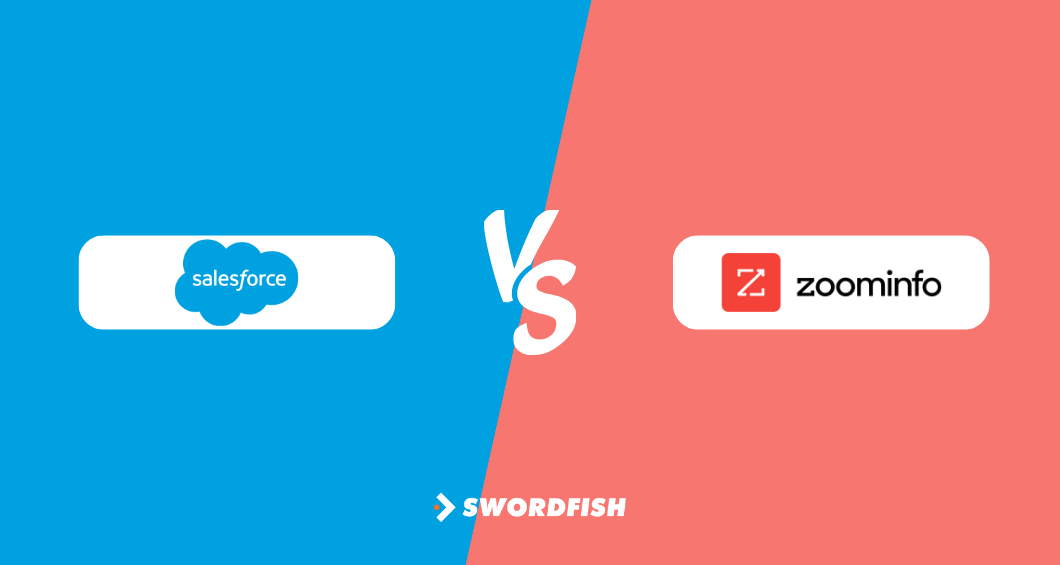
Here’s a guide to make it easier for you to choose –
- B2B Focus with ZoomInfo: If your main game is B2B sales and marketing, think about going with ZoomInfo. It’s really good for digging up detailed business contacts and has a knack for scoring leads based on business stuff.
- Salesforce for a Wider Reach: Need something that handles both B2B and B2C? Salesforce could be your go-to. It’s a powerhouse for managing all sorts of customer relationships, sales, and marketing across different channels.
- Data Quality Showdown: ZoomInfo shines with a huge B2B database and keeps its data sharp and accurate. Salesforce plays a different game, offering a big-picture view of customer interactions with smart AI insights.
- Integration Smarts: Both platforms are pretty savvy with integrations. ZoomInfo gets cozy with CRM and marketing systems, pumping them with rich B2B data. Salesforce? It’s like a Swiss Army knife, fitting into all sorts of tools to foster its CRM muscle.
- Pricing Puzzle: Money matters, right? ZoomInfo might lean towards the pricier side, especially if you’re after those B2B insights. Salesforce has a more flexible approach to pricing, so it can fit into different business budgets.
Swordfish AI: The Best Alternative of Salesforce and ZoomInfo
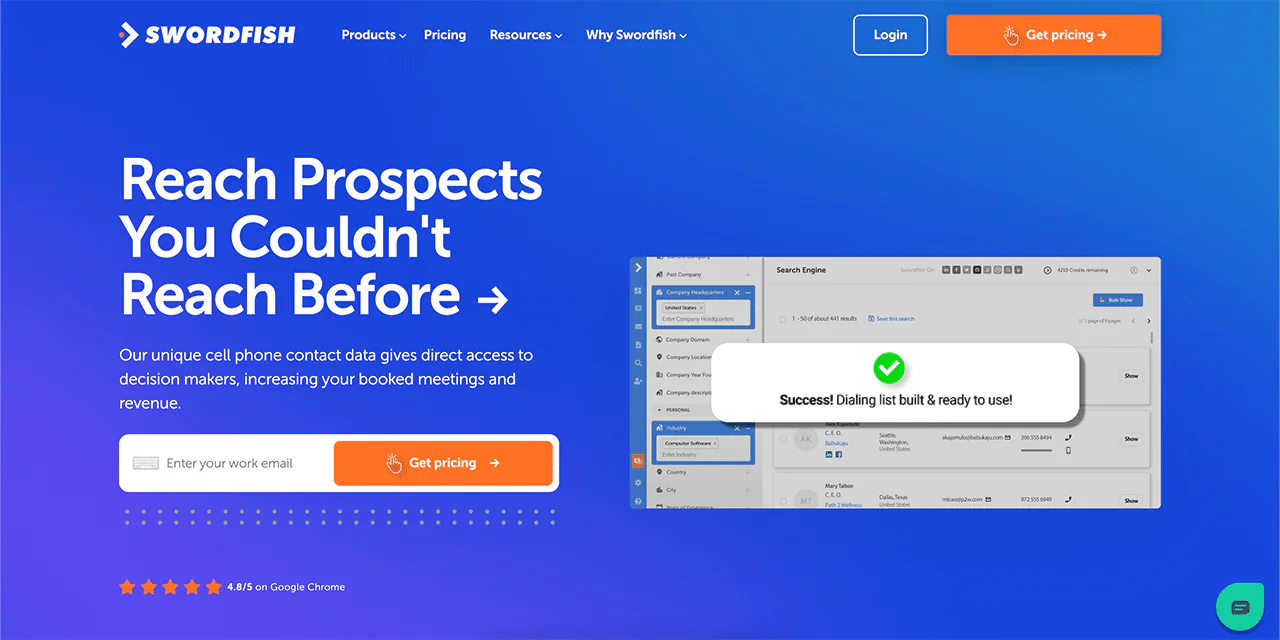
Swordfish AI carves a unique niche in sales intelligence with features that make it stand out against big names like Salesforce and ZoomInfo.
With over 50,000 professionals using our platform, we specialize in providing direct, real-time verified contact information. This focus sets us apart from Salesforce’s broad CRM capabilities and ZoomInfo’s emphasis on B2B data.
What makes Swordfish stand out from the crowd is its proprietary cell phone matching algorithms and partnerships with cell phone carriers, delivering unmatched accuracy in contact information.
This specialization in cell phone data and premium business emails differentiates from Salesforce’s wider CRM functionalities and ZoomInfo’s extensive B2B database.
Plus, the Swordfish AI Chrome Extension is a significant advantage, allowing seamless verification of contact information across platforms like LinkedIn, Twitter, and Facebook.
We offer a more direct and user-friendly approach compared to the more complex integrations of Salesforce and the B2B-centric tools of ZoomInfo.
Features of Swordfish AI
Now, let’s find out which Swordfish AI features stand out –
Chrome Extension
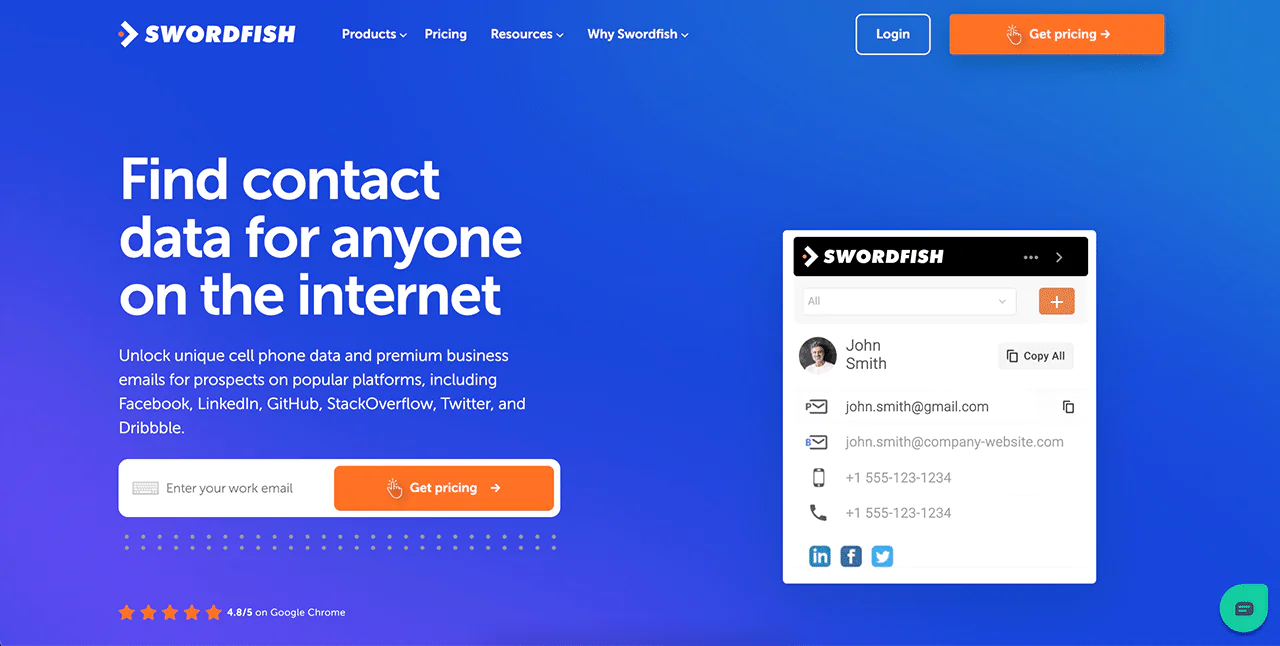
Swordfish AI’s Chrome Extension simplifies the process of accessing contact information. It’s more efficient than similar tools from ZoomInfo and Salesforce, especially for quick data retrieval across multiple web platforms like LinkedIn, Twitter, and Facebook.
Prospector Tool
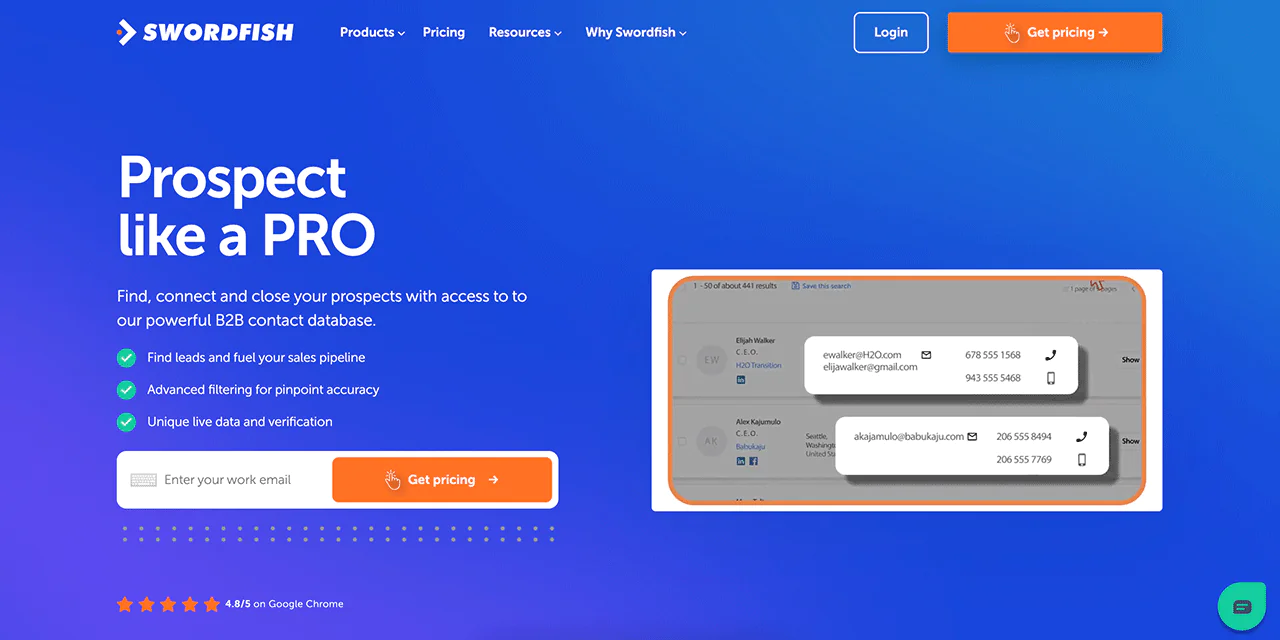
The Prospector Tool in Swordfish AI stands out for its ability to create detailed and focused lead lists. It competes closely with ZoomInfo’s search potential and surpasses Salesforce in efficiency, making it a valuable asset for targeted lead generation.
Reverse Search
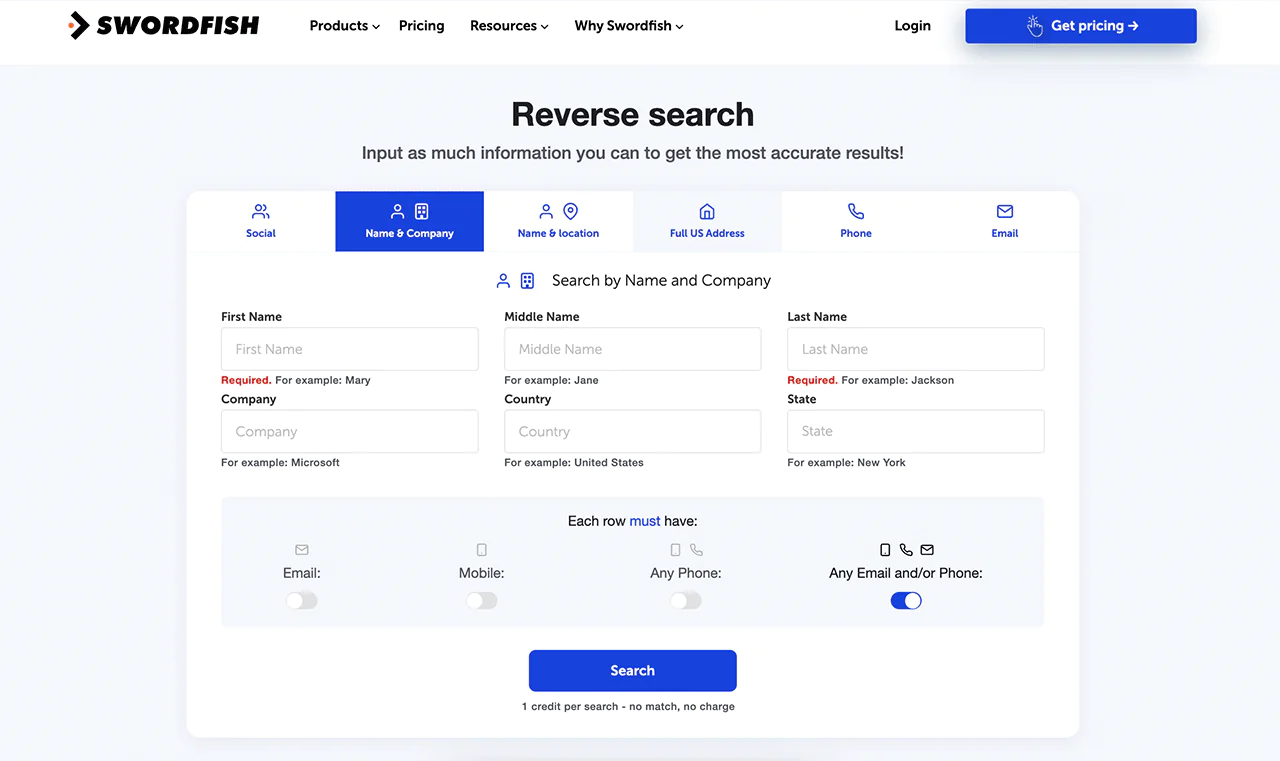
Swordfish AI’s Reverse Search feature offers deeper and more all rounder data discovery options compared to the basic functionalities available in Salesforce and ZoomInfo.
File Upload
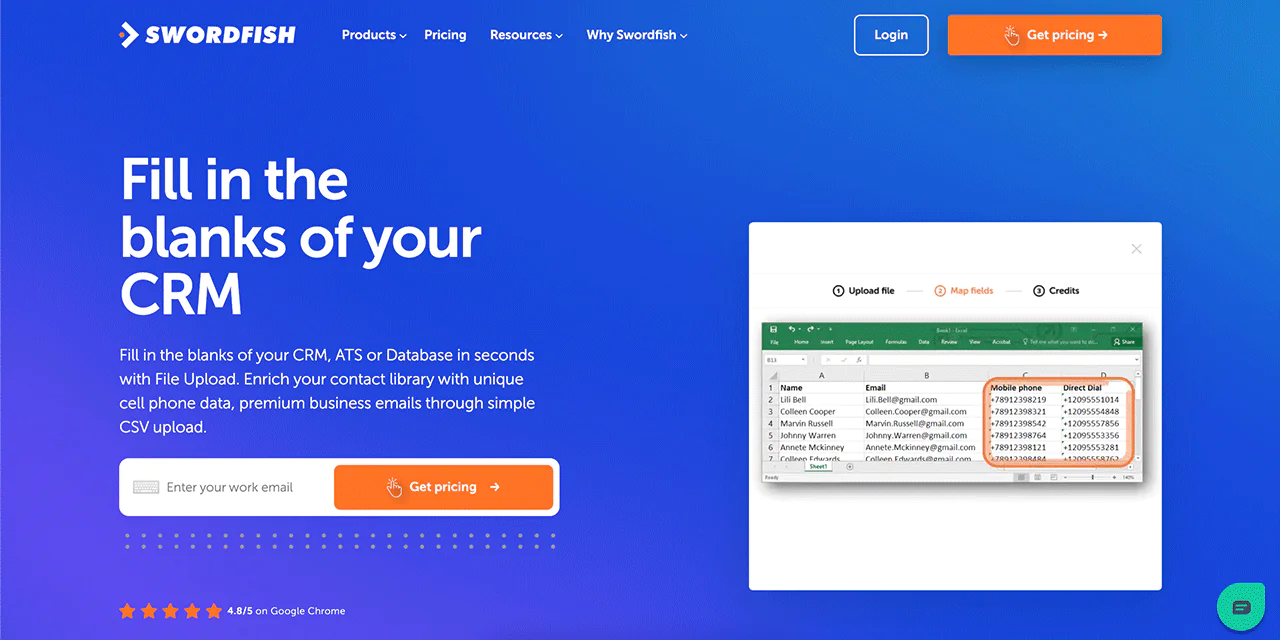
When it comes to handling large datasets, Swordfish AI offers a more user-friendly approach than both Salesforce and ZoomInfo. Its File Upload feature simplifies the process of uploading and enriching contact data, making data management more efficient and less cumbersome.
API Integration
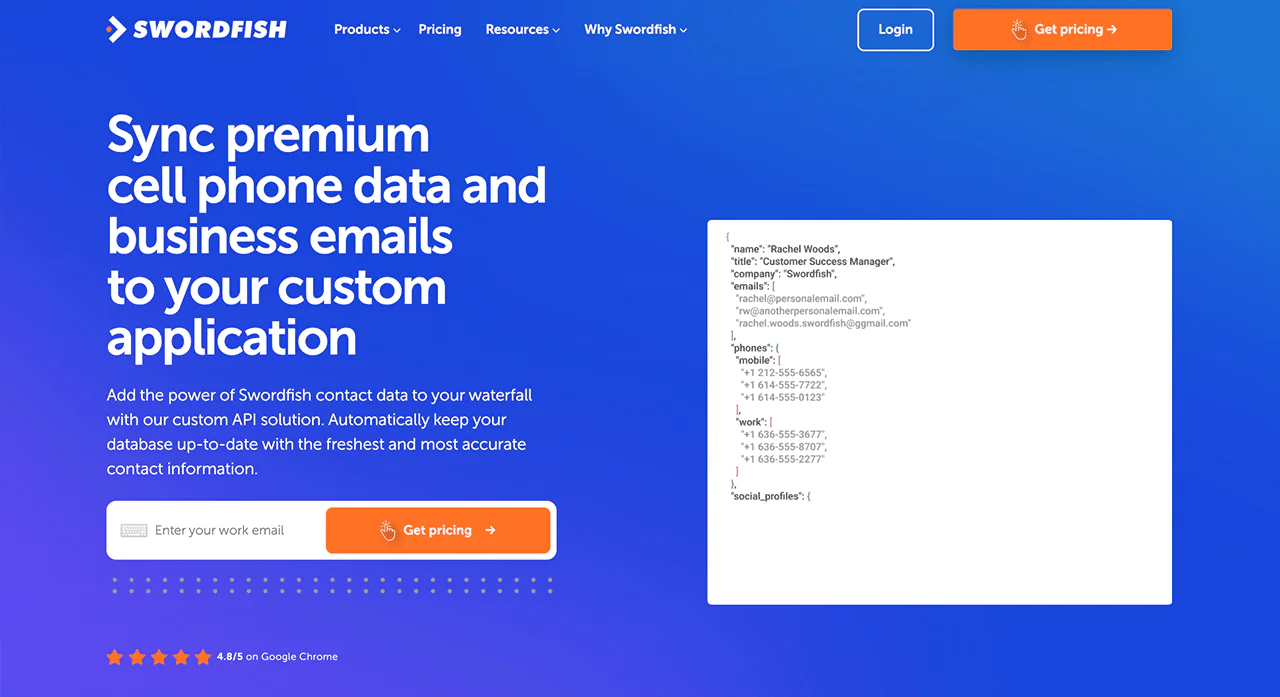
Swordfish AI improves sales intelligence through its flexible API integration. This feature allows for a seamless blend of Swordfish AI’s database with various systems. We give you a level of versatility and integration proficiency that is more adaptable than what’s available in Salesforce and ZoomInfo.
Pricing
Swordfish AI offers flexible pricing plans designed to cater to a variety of business needs, whether you’re involved in sales, marketing, recruitment, or API integration.
These plans are made to provide you with accurate email addresses, direct dial phone numbers, and mobile contacts, ensuring you have the most relevant and up-to-date information for your business operations.
Additionally, Swordfish AI provides an opportunity to experience its services through a custom free trial, which includes 500 credits.
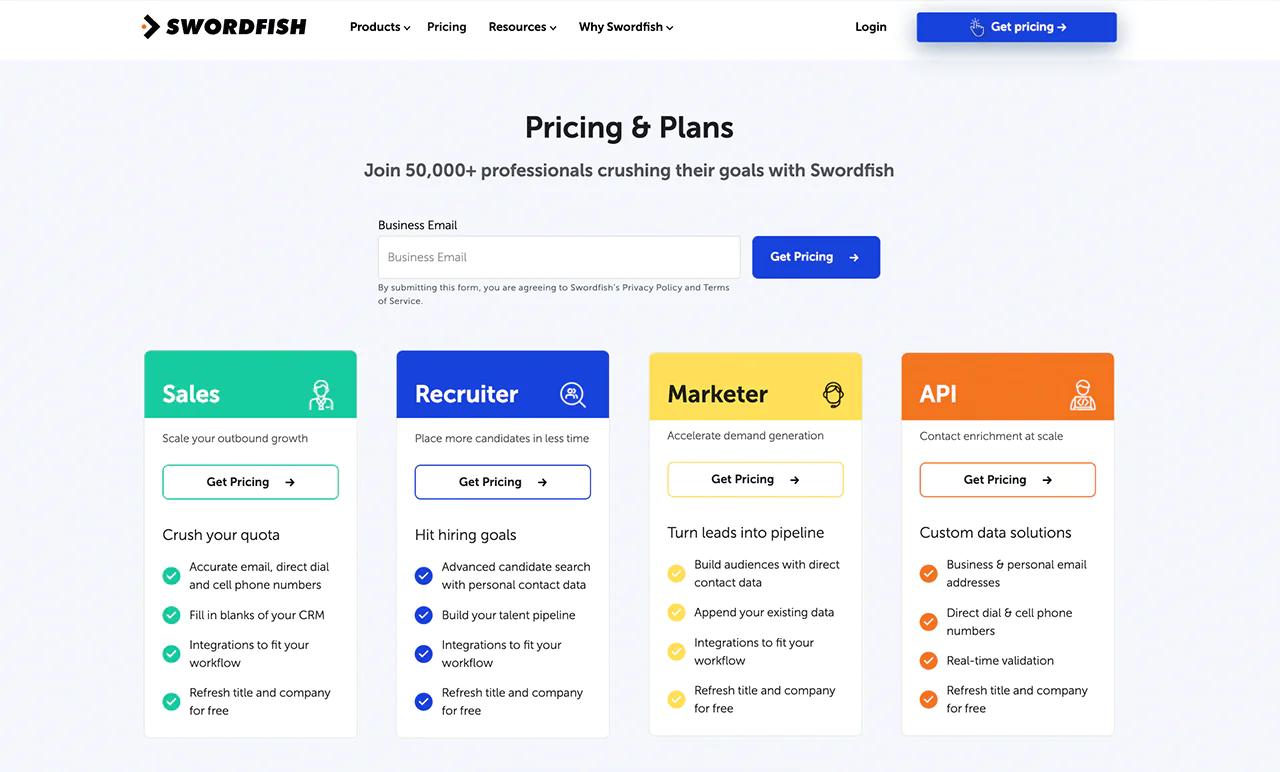
Comparison Table: Salesforce vs ZoomInfo vs Swordfish AI
Here’s a comparison table for ZoomInfo, Salesforce, and Swordfish AI
|
Features |
ZoomInfo | Salesforce | Swordfish AI |
| Database Size | Over 600 million professional profiles | Global CRM database with diverse customer data (not mentioned) |
Specializes in cell phone and email data with 3.5 billion data points |
|
CRM Integration |
Integrates with Salesforce, HubSpot, Microsoft Dynamics | Integration with various CRM platforms like Google cloud, Mailchimp, Slack | Seamless integration with CRM platforms and social media, Hubspot, Linkedin, Zapier |
| Data Accuracy | Regularly updated for database accuracy | AI-driven insights for data accuracy and relevance |
Real-time line connectivity validation |
|
Market Focus |
Wide market appeal across various sectors | Serves both B2B and B2C markets, adaptable for various business models | Focuses on sales & recruitment professionals |
| Chrome Extension | Web-based tools for contact discovery | Great suite of tools accessible via web and mobile |
Chrome Extension for easy contact data access |
|
Prospecting Tools |
Advanced search and filtering options | Sales force programs, sales ai, for lead management and customer engagement | Prospector tool for targeted dialing/email lists |
| Unique Features | Firmographics, Dynamic Signals, Demographics | All inclusive sales forecasting, workflow automation, AI power |
Reverse Search, File Upload, API integration |
Salesforce vs ZoomInfo vs Swordfish: Which One Should You Pick?
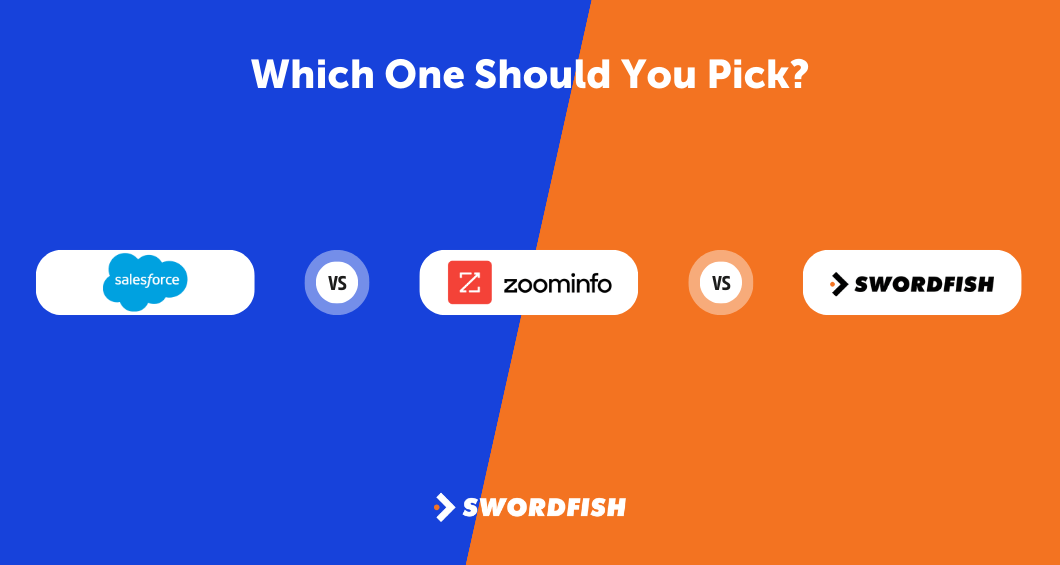
When you’re deciding between Salesforce, ZoomInfo, and Swordfish AI, it’s not about which one is the best overall. It’s more about what you need for your business. Each of these platforms has its own special features and strengths.
Salesforce: Your All-in-One CRM Solution
If you need a tool that handles everything from customer relationships to sales and marketing, Salesforce is a great choice. It’s perfect for businesses that want a single platform to manage both B2B and B2C interactions.
Salesforce is known for its powerful integrations, smart AI insights, and the ability to customize it to fit your business needs. It gives you a complete picture of your customer interactions, making it a top pick for a across-the-board CRM approach.
ZoomInfo: The B2B Data Specialist
ZoomInfo is the way to go for in-depth B2B data and insights. With a massive database of over 600 million professional profiles, it’s a favorite among sales and marketing pros who are targeting other businesses.
ZoomInfo helps you dive deep into company details and stay updated with regular data refreshes. If you’re looking to grow your B2B connections and need detailed company insights, ZoomInfo has got your back.
According to Zoomingo reviews, the intent data feature is like having a crystal ball. ZoomInfo’s intent data shows you which companies are actively searching for products or services like yours.
Swordfish AI: The Contact Info Expert
Turn to Swordfish AI when you need the most accurate and real-time contact info. It’s a standout choice for you if you rely on up-to-the-minute cell phone and email data.
Swordfish AI’s Chrome Extension makes finding contact info a breeze, and its unique data validation methods confirm that you’re always working with reliable information.
If getting straight to the decision-makers with precise contact details is your goal, give Swordfish AI a try.
Conclusion
As we wrap up this comparison of ZoomInfo vs Salesforce, it’s clear that both have value depending on your business needs.
Salesforce is your go-to if managing every aspect of customer interaction is key for you. It’s an all inclusive CRM platform perfect for handling a wide range of customer relationships.
On the flip side, if your focus is more on gathering detailed B2B contacts and data, then ZoomInfo should be your choice.
It really boils down to what you need more: a full-fledged CRM system or in-depth B2B data. However, the best solution can be Swordfish AI. It merges ZoomInfo’s depth of database with Salesforce’s AI procedures, creating a unique solution for B2B sales and marketing teams.
FAQs
Which tool is best for small businesses, ZoomInfo, Salesforce, or Swordfish AI?
For small businesses, the choice depends on specific needs. Salesforce offers a wide CRM solution ideal for managing customer relationships across various touchpoints. ZoomInfo excels in providing detailed B2B data, suitable for targeted marketing and sales strategies. Swordfish AI, with its focus on direct contact information, is great for businesses prioritizing direct outreach and sales.
Can Salesforce integrate seamlessly with ZoomInfo and Swordfish AI?
Yes, Salesforce can integrate with both ZoomInfo and Swordfish AI. ZoomInfo’s integration soars Salesforce’s CRM aptness with additional B2B data, while Swordfish AI’s integration provides direct, verified contact information.
Is Swordfish AI a more affordable alternative to ZoomInfo and Salesforce?
Swordfish AI’s affordability compared to ZoomInfo and Salesforce depends on the specific features and scale of use required by a business. While it offers competitive pricing, especially for its direct contact information services, businesses should evaluate their specific needs against each platform’s offerings to determine the most cost-effective solution.

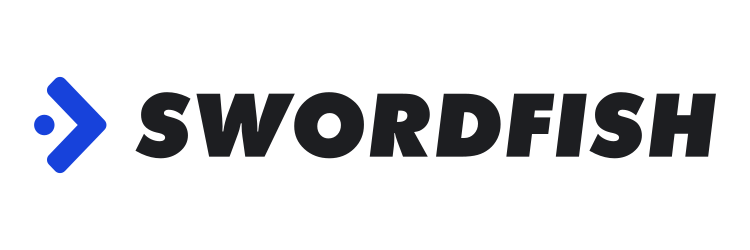
 View Products
View Products


